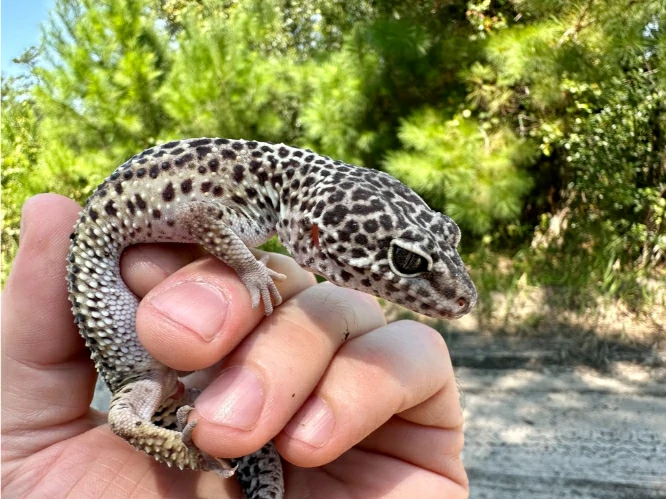You come home after a long day, maybe you’ve been working or just running errands, and you peek into your gecko’s tank. Everything looks fine.
The water is clean, the heat lamp is on, and your little gecko seemed okay earlier. But then, your heart drops; they’re lying there still. It’s sudden, shocking, and you can’t help but ask: why did this happen? Why do geckos die suddenly?
Sudden gecko deaths usually happen because of stress, sickness, or problems in their environment. Geckos are tough, but they’re also sensitive. Changes in temperature, humidity, diet, or even other animals nearby can stress them out. Stress can weaken their immune system, leaving them open to infections or organ problems.
For example, imagine a gecko living in a warm, humid tank and suddenly the heat lamp goes out at night. Even a few hours in cooler temperatures can shock their tiny body.
If the humidity drops too low, it can dry out their skin and lungs, making them more likely to get sick, like catching pneumonia.
It’s not just temperature and humidity. Poor diet or dehydration can play a big role too. Geckos need certain nutrients, like calcium and vitamin D3, to keep their bones, muscles, and organs healthy.
A shortage of these can cause serious health problems that sometimes don’t show up until it’s too late.
Common Causes of Sudden Gecko Death
Several things can lead to an unexpected loss; some you can prevent, some you can’t.
1. Improper Temperature or Humidity
Geckos are cold-blooded, which means they rely on their environment to control their body temperature. If their tank is too hot, too cold, too dry, or too humid, it can stress their body fast.
For example:
-
Leopard geckos need a warm side around 88–90°F and a cool side around 75–80°F. If it drops too low at night, their digestion slows and they can get weak.
-
Crested geckos like moderate humidity around 60–80%. Too low, and they get dehydrated; too high, and they can get respiratory infections.
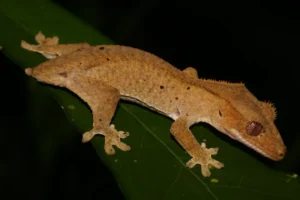
Even a small, ongoing imbalance can weaken a gecko over time, and eventually, stress can lead to sudden death.
2. Impaction
Impaction happens when a gecko eats something it can’t digest (often substrate like sand, gravel, or even big food pieces)and it blocks their digestive system.
Signs can be subtle: a gecko may stop eating for a day or two, look bloated, or become sluggish. Sometimes it becomes serious very fast.
Without help, impaction can lead to death in just a few days. This is one of the most common preventable causes of sudden gecko death.
3. Infections and Parasites
Even healthy-looking geckos can carry bacterial, viral, or parasitic infections that aren’t obvious at first.
-
Bacterial infections: Often from poor hygiene, contaminated food, or wounds.
-
Respiratory infections: Usually triggered by cold or humid conditions. A gecko may eat and move normally until the infection takes over.
-
Parasites: Internal worms can slowly drain nutrients, sometimes without any signs.
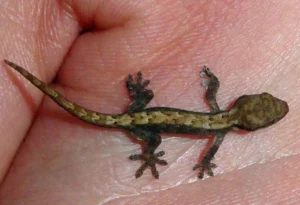
Because these issues can be hidden, geckos might seem fine one day and get sick fast the next.
4. Heart Problems
Some geckos, especially bigger ones like tokays, can have heart problems. Birth defects or age-related heart issues can cause sudden heart failure.
Even geckos that look healthy can have this happen because small lizards don’t always show warning signs.
5. Stress and Environmental Shock
Stress is a bigger factor than most people think. Geckos are sensitive to:
-
Being handled too often or roughly
-
Moving to a new tank
-
Loud noises or vibrations
-
Sudden changes in temperature or humidity
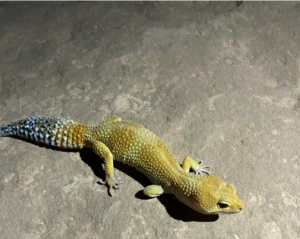
A stressed gecko can get weak over time, and in extreme cases, stress can contribute to sudden death. Stress affects their immune system, digestion, and overall health.
6. Old Age
Sometimes geckos just reach the end of their natural life. While it might seem sudden, older geckos may slowly decline and then pass over a short period.
For example, leopard geckos usually live 15–20 years, and crested geckos 15–25 years. Even a healthy, well-cared-for gecko may eventually die without warning.
7. Toxins or Accidental Poisoning
Geckos are small and sensitive. Household chemicals, insect sprays, cleaning agents, or even contaminated food can be fatal if eaten.
Sometimes owners don’t even realize the exposure, which can lead to sudden death.
Why It Feels So Sudden
Even when death comes from one of the causes above, it often feels instant because geckos hide pain or illness well. They may eat, climb, and act normal until their body hits a critical tipping point.
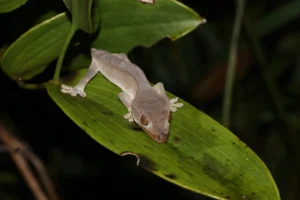
It’s like wild animals. They hide weakness to avoid predators, so they can endure a lot before any sign of sickness shows.
How to Reduce the Risk of Sudden Death
Some causes, like heart defects, can’t be prevented, but you can do a lot to reduce risk:
Maintain Proper Temperature and Humidity
-
Use reliable thermometers and hygrometers.
-
Watch day and night conditions carefully.
Use Safe Substrate
-
Avoid loose sand, gravel, or small particles they can swallow.
-
Paper towels, reptile carpet, or tile are safer.
Feed a Balanced Diet
-
Include supplements like calcium and vitamins.
Clean and Sanitize the Tank
-
Remove waste quickly.
-
Clean water dishes and hides regularly.
Minimize Stress
-
Handle gently and not too often.
-
Give plenty of hiding spots.
-
Avoid sudden environmental changes.
Regular Vet Checkups
-
Even healthy geckos benefit from routine exams.
-
A vet can check for parasites, infections, or metabolic issues.
Watch for Early Warning Signs
-
Reduced appetite
-
Sluggish or slow movement
-
Tail loss or unusual swelling
-
Changes in color or skin
Catching problems early can prevent what otherwise feels like sudden death.
What to Do If a Gecko Dies Suddenly
It’s painful, but there are practical steps:
-
Check the environment for clues: temperature, humidity, chemicals, or food.
-
Consider a necropsy if you want to know the cause. Some vets do postmortems on small reptiles.
-
Sanitize the tank before adding new pets.
-
Think about your husbandry to prevent future problems. Even small adjustments can make a big difference.
Frequently Asked Questions
Why do geckos randomly die?
Geckos almost never “just die” out of nowhere. What seems random is usually hidden sickness, organ problems, or stress from their environment.
Things like metabolic bone disease, parasites, respiratory infections, or sudden temperature changes can make them collapse quickly. Because geckos hide signs of being sick, it can feel like it came out of nowhere.
Can stress really kill a gecko?
Yes, stress can be serious. Geckos have delicate systems, and long-term or extreme stress can weaken their immune system, mess up digestion, or even affect their heart. Bright lights, loud noises, or aggressive tank mates can all add to it.
How can I tell if my gecko is sick before it’s too late?
Look for changes in appetite, how active they are, their weight, or skin color. Small signs like hiding more than usual, moving slowly, or having trouble shedding can mean something’s off. Catching it early matters because geckos often hide being sick until it’s serious.
Could a gecko die from eating the wrong food?
Absolutely. Impaction (when they eat something they can’t digest, like substrate or big insects) is common. Feeding a poor diet that doesn’t have enough calcium or vitamins can also lead to serious problems like metabolic bone disease.
Are certain geckos more likely to die suddenly?
Some species, like crested geckos or leopard geckos, are more sensitive to temperature and humidity changes.
Young geckos and older ones are also more likely to get sick or stressed.
Conclusion
Sudden gecko death is scary, but knowing the causes can help prevent many cases. Improper temperature or humidity, impaction, infections, stress, heart issues, toxins, and age are the main culprits.
What feels sudden is often hidden illness or stress building up without visible signs.
By keeping the environment stable, using safe substrates, giving a balanced diet, minimizing stress, and watching for early warning signs, you give your gecko the best chance at a long, healthy life.
Even though we can’t prevent every loss, careful care reduces the risk of heartbreak. Next time you check on your little climber, take comfort knowing your attention, proper environment, and care are the best insurance for a happy, healthy gecko.
And if something does happen unexpectedly, understanding why can help you cope and improve care for future pets.
Hi, my name is Ezra Mushala, i have been interested animals all my life. I am the main author and editor here at snakeinformer.com.

